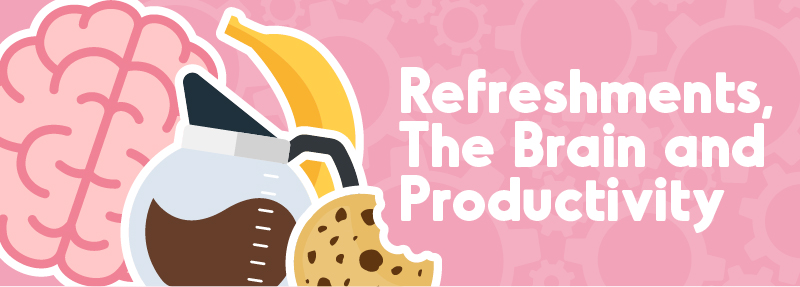
You’ve probably heard people tout the connection between food, drink and working environment to people’s productivity before, but does coffee help you do more work, is breakfast the most important meal of the day, and what is the science behind how and where you work? In this article we’re taking an in-depth look at the link between refreshments and productivity including the science behind how coffee affects the brain, how refreshment breaks can benefit you and how your work environment can affect your mood.
Before we dive into these different topics, it’s important to understand the different positive outcomes we’re talking about. Productivity might mean your staff get more work done and therefore increase how much money the company can make in any given week, but it doesn’t mean they’re happy or willing to stay in their job for long. The morale of your staff, on the other hand, can mean you have an extremely happy team in your office, but that alone doesn’t mean that this will help you get any more work from them than usual.
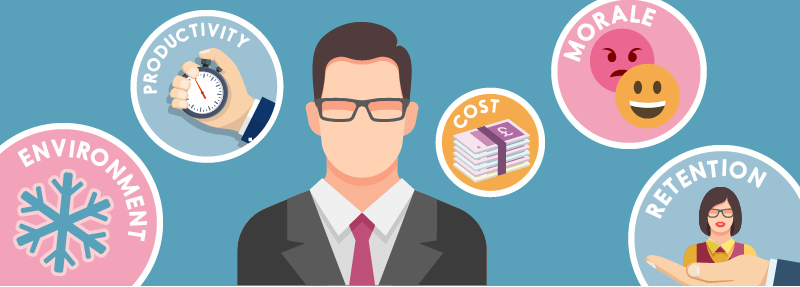
What you need is combination of these factors, combining the happiness of your staff with their increased productivity to create the perfect business system. There is no one sure-fire way to make this happen though, because everyone is different and we all respond to a range of incentives and policies in a variety of ways.
Why coffee keeps us alert
Everyone knows that coffee is a source of energy for adults – particular those working in an office environment – but why? How does is actually impact your concentration and focus in your daily life?
The Science – Back in 2005, Florian Koppelstätter of the Medical University at Innsbruck, Austria, told New Scientist that “Caffeine modulates a higher brain function through its effects on distinct areas of the brain”.
Caffeine has long been the source of our perkiness, and it’s the chemical reaction in the brain where it really hits home. Replacing the chemical adenosine – which usually makes us sleepy – the caffeine blocks our adenosine receptors, keeping us alert and awake. Eventually, our bodies try to catch up with this impact by producing more receptors, meaning that we require more coffee to stave off the yawns and heavy eyelids.
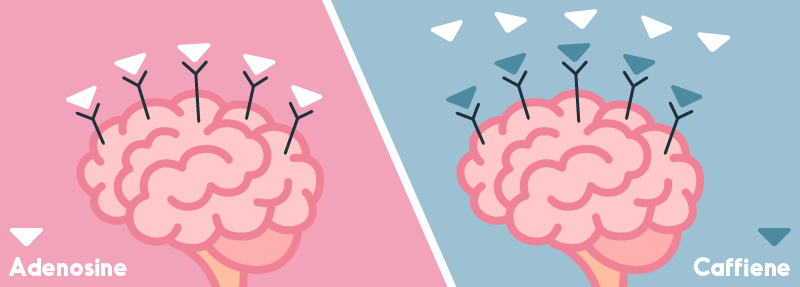
How coffee at work can benefit productivity
Knowing the science, it’s easy to see why coffee is a staple of most offices, with machines, percolators and other apparatus giving staff access to caffeine. The quality of this resource is something which some of your staff might rely on, so proper investment in this can not only keep them focused on the job, but it can also show them you’re in tune with their needs – something we’ll discuss more later. The more energy they have, they more they can get done – just don’t overdo it to the point where people get the shakes, this is an indication that someone has too much caffeine in their body.
If you’re waiting for the caffeine to kick in while reading this, multiple studies have come to different conclusions, but it’s generally thought to take anywhere between 10 to 45 minutes to have an impact, depending on the individual.
Is breakfast the most important meal of the day?
For anyone who skips their breakfast, the old adage that “breakfast is the most important meal of the day” will be greeted with an eyeroll or a sigh. But is there truth in this? Will one meal make or break your day at work?
The benefits of eating breakfast
The Science behind eating breakfast
It shouldn’t take a large study conducted by boffins in lab coats to make the connection between fuelling our bodies when we wake up and increased energy, concentration and a boosted memory, but if there was any doubt, you can read Fast Company’s Michael Grothaus’ personal experiment with breakfast.
He found that, having not eaten breakfast for years, once he started the habit there was a noticeable difference in his ability to start work. It began with sugary cereals, giving an instant high but leaving him hungry later, before more nutritional breakfast gave less of a jolt, but a full stomach which lasted longer into the day.
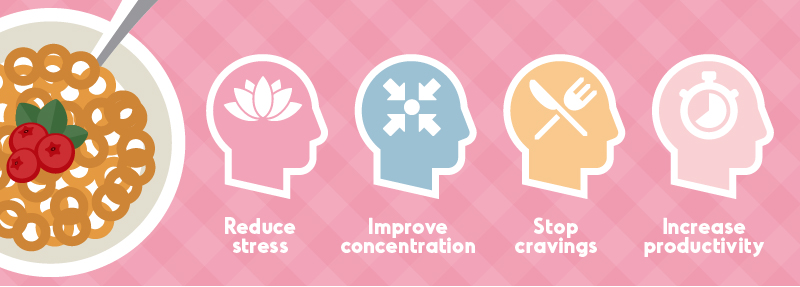
The benefits of offering breakfast to staff
If you’re not keen on the idea of eating the moment you wake up, you could always try a bowl of porridge, some fruit or even a pastry once you get to work. This will help you deal with cravings between 9am and lunch, and can be vital for your productivity.
It might seem like a strange interest to take in terms of your staff, but providing them with ways to get breakfast – either by simply giving them kitchen facilities with milk and a toaster, or having breakfast baskets delivered with muffins – will no doubt see the morale and the concentration of staff boosted. Not everyone will take you up on the offer, some people are habitual with their eating pattern, but even the gesture itself can go a long way.
Benefits of eating fruits and other snacks at work
We’ve covered breakfast, but what about the need to snack throughout the day? Is it something you and your staff should be doing regularly, and what types of snacks will benefit you most when at work?
The Science – If you’re finding yourself irritable and tired at work, then fruits, vegetables and other healthy snacks will be a great help to you. Nutrition plays a huge part in how our brains work, with anxiety and depression linked to a poor diet for some people. Vitamins E and C work as antioxidants and improve your immunity, while vitamin D has been closely linked with improving our moods.
It’s suggested that folate and B-12 are also linked with lowering depression, so get some leafy greens, broccoli, salmon and lean beef in your diet to boost your mood. Fibre, on the other hand, will keep your digestive system moving and increase the release of serotonin into the bloodstream for a better mood.
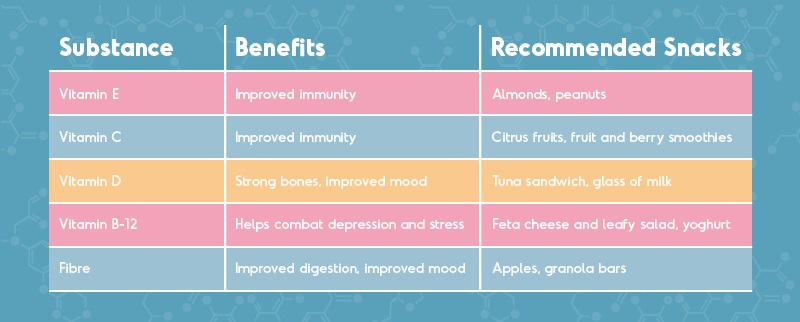
It definitely takes some restraint to eat healthy snacks and fruits regularly, as a recent study of our brains at Yale University showed. Carbs and fats are thought to trigger our reward centre via a dopamine boost, and thereby make us more likely to overeat with less healthy foods.
Healthy food and productivity
You can also think of the wider impact of healthy eating, with malnutrition in adults leading to a loss of productivity in the workplace for everyone. If people have weak immune systems or suffer from anxiety and depression, they’re more likely to take time off sick. This low morale – as well as sickness bugs – can also spread to other staff, so it’s worth considering the health and mood of your workforce carefully.
How refreshment breaks benefit the workplace
Are you busy right now? That’s our excuse for never taking proper breaks – there’s always too much to do. Perhaps you manage to take a brief pause at your desk for lunch, but is that really enough? Could we do better work and live healthier lives if we took proper, regular breaks?
The Science – While to some it might seem counterproductive to keep taking breaks throughout the day, the science is there to back it up. According to the University of British Columbia, our brains engage in problem solving far more when we daydream – using “the lateral PFC and the dorsal anterior cingulate cortex” – than when doing menial tasks, meaning that a quick break could help you come up with a solution for a problem.
Aside from this, there are other obvious ways in which a break can help, with physical movement getting the blood pumping and pushing oxygen to the brain. The 2016 study by the International Journal of Behavioral Nutrition and Physical Activity found a quick five minute break improved moods and reduced food cravings, too.
Work break methods
Saying that you and your employees should take more breaks during the day is easier said than done. But if the benefits involve a mood boost, lowered cravings and more creative thinking, then it’s surely worth finding a way. There are several methods touted for getting the work/break balance right, ensuring staff don’t just wander off for one long break and never come back:
- The Pomodoro method – take a 5 minute break for every 25 minutes of work, with a 30 minute break after 4 work sessions
- The Ultradian method – Match your ultradian rhythm with 90 minutes of work and 20 minutes of rest
- The 52-17 method – Work for 52 minutes, then break for 17 – odd numbers but some claim it works
- The 15 Minute method – Take yourself back to school by adding a 15 minute break mid-morning and another mid-afternoon, this is in addition to your hour lunch in the middle of the day
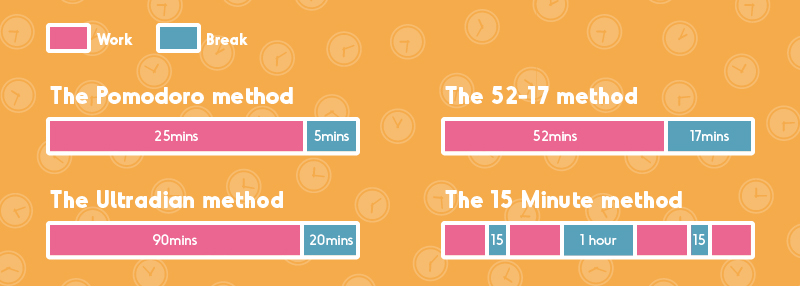
How work and break environments impact productivity
When you’re going to the same place every day of the week, it is already hard to stay motivated, but going to a place which is poorly lit, poorly ventilated and bereft of any amenities can be demoralising. Your staff may still turn up to work, but you’ll get far less out of them if they’re unhappy, according to a study performed by Warwick University – 12% less, to be precise.
The Science – Engaging staff in the company they work for might seem difficult if the industry isn’t a very glamorous one. It’s taken quite some time for companies to realise that the working environment they provide can impact on the productivity of staff, with even the simple arrangement of desks helping to change moods.
Ensuring that staff get sunlight and good air quality can help boost productivity, while breakout areas and social spaces can foster a creative, collaborative spirit which a company can benefit from. It should go without saying that the more staff feel comfortable and at home, the more likely they are to do their best work – it’s all about creating that space which is different from their desk or cubicle.
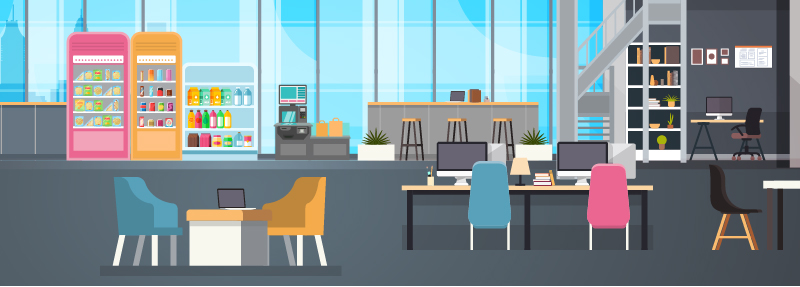
Your work environment – A 2015 survey of EMEA corporate real estate professionals found that 95% are tackling workplace technology to provide a favourable working environment. Whether this is the refreshment services provided – coffee machines, food and cold drinks etc. – or innovation in the space itself – electronic doors and windows, audio-visual technology etc. – it is clearly something more companies are taking note of.
Any company which doesn’t address these aspects of their business – taking care of their clients as opposed to their staff, perhaps – could find themselves falling behind and losing their best staff to competing businesses who do curate exciting work environments.
Food for thought?
If this has given you reason to pause and consider your staff – whether it’s addressing food and drink offerings to increase focus and productivity or the environment itself to boost staff morale and creativity – then you’re already on the right path.
At Nu Vending, we provide a whole host of services to help keep your staff healthy and happy. We can help with something as simple as state-of-the-art coffee machines for a morning jolt, or tackle larger issues with our vibrant Nu InStore service, where we fit your office with a breakout area full of refreshment options just like a small convenience store. We can even arrange for the regular delivery of breakfast snacks to give your staff the fuel they need to start the day right.
Whatever aspect of your staff retention plan you want to improve upon, never underestimate the impact simple provisions of food and drink can have. Contact us today to find our more about our services or to discuss the plans you have for your office.




















